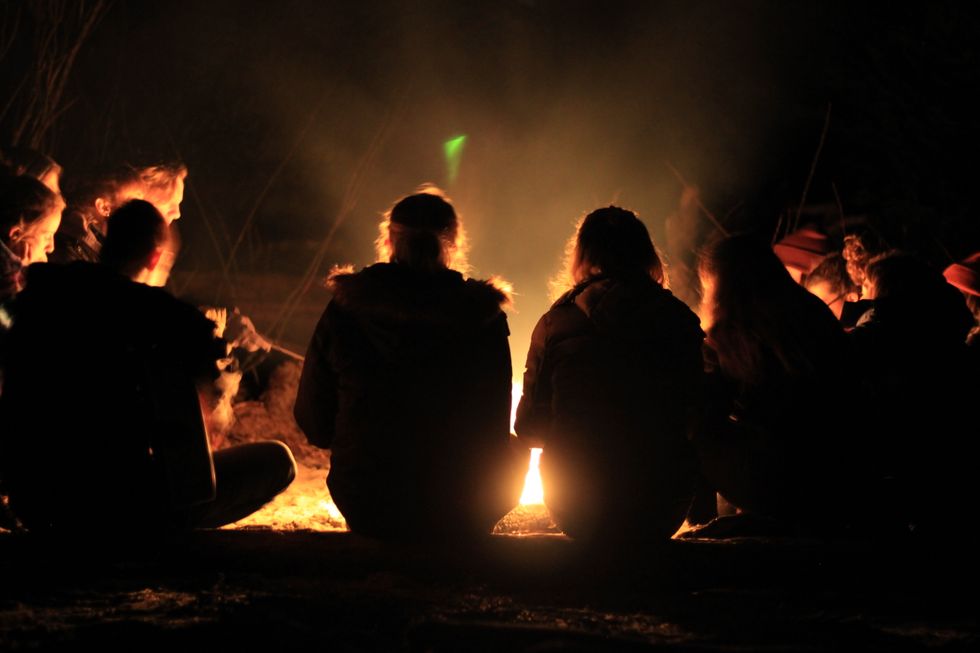Last Thursday, my friend Jazmine came over to hang out around 7:30 p.m. Although the intent was just to catch up on the week and see each other for a bit, we ended up talking for three hours. I had planned a rather solitary evening: Zak was at work, so I had thought about going to the gym and then spending some time in the ceramics lab. Instead, I fell into one of the most valuable conversations of this school year.
This three hour conversation reminded me why the undergraduate years are so memorable, and why I am afraid to leave them behind.
Here's the thing: humans are a social species. We need to feel connected to a place, to feel like we belong. Yet sociability is not the foundation of a true community; the need to be around others is not what makes valuable, three hour conversations. That need may drive the common text "what are you up to"; it does not drive meaningful questions like "What are you going through?"
What is more, this social instinct stand at odds with the need for solitude. In some ways, life is spent alternating between a need for people and a need for time spent alone. I have a high respect for solo time: in solitude I regain a sense of congruence with myself. Yet I eventually reach a point where my own company begins to feel insufficient, and the desire for social interaction urges me to reach out.
My time in college has entirely revised my thoughts on the social and solitary needs. I used to see community as a sort of predictable, self-determined fulfillment of the social need. I heard people talk about the Fox community, the church community, the res life community... and assumed all these things were just organized social groups.
What I've realized is that I was wrong. The place where the social need is met, is society. That is, the social instinct asks little more than interaction with other humans. Community, on the other hand, requires both social and solitary needs to come together, and be transformed into something greater.
The societal model asks the individual to bring something worth having, and trade it for something they need; it is a market of social goods. The community, however, asks the individual to bring their whole selves, with their solitude, into a commitment with others.
A society believes in weekly lunch dates and casual, friendly conversation. A community embraces three hour conversations and unplanned moments of vulnerability. A society avoids "dangerous" topics (politics, religion, tragedy, pain); a community brings all conversations to a shared table.
If I had come to college and developed a social life, I would feel no sorrow in leaving after graduation. This may not be true of everyone else, but I know personally that when I approach people as social groups, my true, whole self remains separate. Instead, graduation feels incredibly bittersweet because this is where I found communities and brought my whole, unabridged self into commitment with others.
The gratitude I feel for these years has a shadow of fear: some part of me doubts that I will ever find communities like I have had here. I envision a 45-year-old version of myself: I may have a happy family, a good job, a church home, but I cannot know with confidence that this middle-aged Abby has a true community. It forces me to acknowledge that I will need to be a community-maker, if I want to guarantee having one myself.
Thankfully, my present community can help me with this fear. That three hour conversation included an honest talk about church, community and the role of others in individual faith. The conversations I have now are adding value to the life of that 45-year-old me in the future, enriching the soil that I will continue to grow in.
That is the beauty of a community: there is nothing temporary or short-lived about it. Where societies and social lives act like Tylenol, relieving the discomfort of loneliness, communities contribute to healthier choices that increase well-being in lasting ways.
Where have you found community, rather than settling for a social life? How do solitude and sociability come together to enrich your community? Are you bringing your whole self to the table? These are questions I will be asking myself this week, and I encourage you to message or contact me if you want to talk about them, too!



















